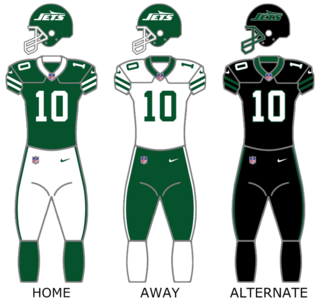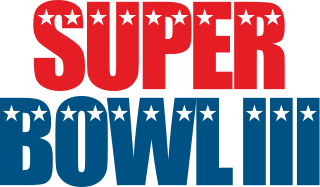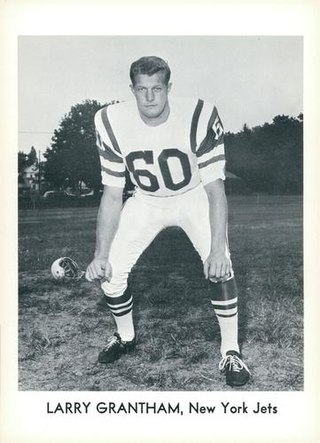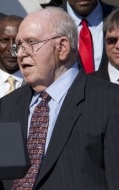
The New York Jets are a professional American football team based in the New York metropolitan area. The Jets compete in the National Football League (NFL) as a member of the American Football Conference (AFC) East division. The Jets play their home games at MetLife Stadium in East Rutherford, New Jersey, 5 miles (8.0 km) west of New York City. The team is headquartered in Florham Park, New Jersey. The franchise is legally organized as a limited liability company under the name New York Jets, LLC.

Super Bowl III was an American football game played on January 12, 1969, at the Orange Bowl in Miami, Florida. It was the third AFL–NFL Championship Game in professional American football, and the first to officially bear the trademark name "Super Bowl". Super Bowl III is regarded as one of the greatest upsets in both American football history and in the history of professional sports. The 19 1⁄2- points underdog American Football League (AFL) champion New York Jets defeated the National Football League (NFL) champion Baltimore Colts by a score of 16–7.

James Larry Grantham was an American professional football player who was a linebacker for the New York Titans/Jets of the American Football League (AFL) and later National Football League (NFL). He played college football for the Ole Miss Rebels. He also played pro ball for the Florida Blazers of the World Football League (WFL).

Roland Owen McDole is an American former professional football player who was a defensive end in the American Football League (AFL) and National Football League (NFL). He played college football for the Nebraska Cornhuskers.
James Efflo Tyrer was an American professional football offensive tackle who played in the American Football League (AFL) for the Dallas Texans / Kansas City Chiefs. He also played in the National Football League (NFL) for the Chiefs and the Washington Redskins.
James Bayard Turner was an American professional football placekicker who played in the American Football League (AFL) and National Football League (NFL) for the New York Jets and Denver Broncos. He was a two-time Pro Bowl selection with the Jets and a member of their Super Bowl III championship team. Turner was chosen for the AFL All-Time Second-team and the Denver Broncos Ring of Fame.

James David "Buddy" Ryan was an American football coach in the National Football League (NFL) and American Football League (AFL). During his 35-season coaching career, Ryan served as the head coach of the Philadelphia Eagles from 1986 to 1990, and of the Arizona Cardinals from 1994 to 1995. Ryan also served as the defensive coordinator of the Chicago Bears from 1978 to 1985, and of the Houston Oilers in 1993. Coaching multiple Hall of Fame defensive players throughout his career, Ryan is considered by many to be one of the greatest defensive minds in the history of American football.

William Ferdie Brown was an American professional football player, coach and administrator. He played as a cornerback for the Denver Broncos and the Oakland Raiders of the American Football League (AFL) and later in the National Football League (NFL). Following his playing career, Brown remained with the Raiders as an assistant coach. He served as the head football coach at California State University, Long Beach in 1991, the final season before the school's football program was terminated. Brown was inducted into the Pro Football Hall of Fame as a player in 1984. At the time of his death he was on the Raiders' administrative staff.
Gerald Avery Mays was an American professional football player who was a defensive end for the Dallas Texans/Kansas City Chiefs. He played college football for the SMU Mustangs.
Kenneth Ray Houston is an American former professional football player who was a safety in the American Football League (AFL) and National Football League (NFL). He was inducted into the Pro Football Hall of Fame in 1986.

Benjamin Earl Davidson was an American professional football player who was a defensive end, primarily with the Oakland Raiders of the American Football League (AFL). He was a three-time AFL All-Star with the Raiders. Earlier in his career, Davidson was with the Green Bay Packers and Washington Redskins of the National Football League (NFL). He later worked as an actor.
The Fearsome Foursome was the dominating defensive line of the Los Angeles Rams of the 1960s and 1970s. Before them, the term had occasionally been applied to other defensive lines in the National Football League.

John B. Sample Jr. was an American professional football defensive back who played in the National Football League (NFL) for the Baltimore Colts (1958–1960), Pittsburgh Steelers (1961–1962), and Washington Redskins (1963–1965), and in the American Football League (AFL) for the New York Jets (1966–1968), winning three league championships.
John Leonard Wilbur was a professional American football offensive lineman in the National Football League (NFL) for the Dallas Cowboys, Los Angeles Rams and Washington Redskins. He also was a member of The Hawaiians in the World Football League (WFL). He played college football at Stanford University.
Todd Robert Bowles is an American professional football coach and former player who is the head coach of the Tampa Bay Buccaneers of the National Football League (NFL). He previously was the head coach of the New York Jets from 2015 to 2018. Bowles has also been the defensive coordinator of the Arizona Cardinals and Buccaneers and the secondary coach for the Jets, Cleveland Browns, Dallas Cowboys, Miami Dolphins, and Philadelphia Eagles. He played eight seasons in the NFL as a safety, primarily with the Washington Redskins, and was a member of the team that won Super Bowl XXII.
James Clark Hudson was a professional American football defensive back. He was one of the first players to ever win a national championship in college and a Super Bowl as a professional. Hudson played for the New York Jets from 1965 to 1970, playing in both the American Football League (AFL) and National Football League (NFL). He started in Super Bowl III for the Jets, and made a key interception just before the end of the first half.
The 1971 New York Jets season was the twelfth season for the team and the second in the National Football League. It began with the team trying to improve upon its 4-10 record from 1970 under head coach Weeb Ewbank.
The Over-the-Hill Gang was the George Allen-coached Washington Redskins team of the early 1970s, so named due to the large number of veteran players on the team. Many of those players also played for Allen when he coached the Los Angeles Rams from 1966 to 1970.
The 1968 AFL Championship Game was the ninth annual title game of the American Football League, played on December 29 at Shea Stadium in Queens, New York City, New York. In a rematch of the notorious Heidi Game played earlier in the season, the New York Jets (11–3) of the Eastern Division hosted the defending champion Oakland Raiders (12–2) of the Western Division. Although the Raiders had the better record, the Jets were slight favorites. The Raiders had hosted a tiebreaker playoff game the week before against the Kansas City Chiefs (12–2) to determine the Western Division champion, while the Eastern champion Jets won their division outright and thus were idle.







